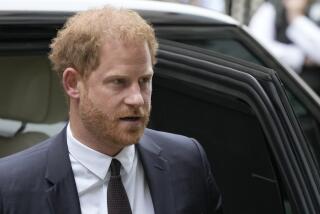Ruse Tip Shuts Lips in London
- Share via
--The British prime minister’s office used a lie about Prince Charles’ wedding plans to stop news leaks to the press, a new book says. The false information was leaked 11 years ago with the connivance of Special Branch, the arm of Scotland Yard that handles political security, and with the assent of Charles’ parents, Queen Elizabeth II and Prince Philip, according to “The Real Charles.” Author Alan Hamilton, a senior journalist at the Times of London, said the source had been feeding “a stream of high-grade, accurate political gossip” to John Warden, then political editor of the Daily Express. The suspected source was fed an inaccurate “but just about plausible” account that Charles would marry Princess Marie-Astrid of Luxembourg, the book says. In fact, the two scarcely knew each other. The story appeared on the front page of the Express. The source was then confronted, confessed and discreetly retired, Hamilton said. Warden has denied that a trap was set.
--Two students’ scientific efforts are about to take off again after a 2 1/2-year delay. Richard Cavoli and Lloyd Bruce, both 24, had experiments aboard the space shuttle Challenger when it exploded on Jan. 28, 1986. Now their experiments, along with nine others, will be conducted during the flight of Discovery, the first post-Challenger mission. “I’ve waited a long time. It’s been seven years since the idea began,” Cavoli said. He and Bruce were high school students--Cavoli in Marlboro, N.Y., and Bruce in St. Louis--when their projects were chosen as possible student experiments for shuttle flights. Cavoli is now in medical school at the State University of New York at Buffalo and Bruce is pursuing general studies at the University of Missouri, Columbia. “I just feel very lucky that we got back on,” Bruce said of the chance to fly the experiment. His experiment with titanium could lead to a superior titanium alloy. Cavoli’s experiment is an attempt to grow larger, purer lead iodide crystals that could one day be used in more sensitive X-ray films.
--If you yearn for the political climate of the ‘60s, take heart. America is heading into another era of change with some familiar themes, such as the civil rights movement, Pulitzer-Prize-winning historian Arthur Schlesinger Jr. told a meeting of the Ohio Historical Society in Columbus. “If the rhythm of politics holds true, the 1990s will be much more like the 1960s,” Schlesinger said. He said he believes that politics tend to move in 30-year cycles. “We’re reaching the end of conservatism,” he said.
More to Read
Sign up for Essential California
The most important California stories and recommendations in your inbox every morning.
You may occasionally receive promotional content from the Los Angeles Times.













